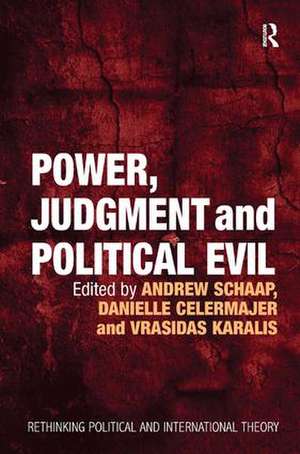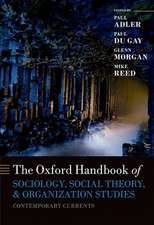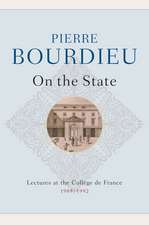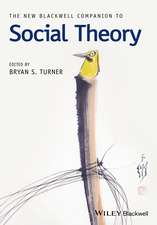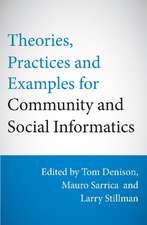Power, Judgment and Political Evil: In Conversation with Hannah Arendt: Rethinking Political and International Theory
Autor Danielle Celermajer Editat de Andrew Schaapen Limba Engleză Hardback – 9 apr 2010
Preț: 935.59 lei
Preț vechi: 1028.13 lei
-9% Nou
Puncte Express: 1403
Preț estimativ în valută:
179.02€ • 186.91$ • 148.17£
179.02€ • 186.91$ • 148.17£
Carte disponibilă
Livrare economică 14-28 martie
Livrare express 27 februarie-05 martie pentru 32.100 lei
Preluare comenzi: 021 569.72.76
Specificații
ISBN-13: 9781409403500
ISBN-10: 1409403505
Pagini: 210
Dimensiuni: 156 x 234 x 13 mm
Greutate: 0.52 kg
Ediția:1
Editura: Taylor & Francis
Colecția Routledge
Seria Rethinking Political and International Theory
Locul publicării:Oxford, United Kingdom
ISBN-10: 1409403505
Pagini: 210
Dimensiuni: 156 x 234 x 13 mm
Greutate: 0.52 kg
Ediția:1
Editura: Taylor & Francis
Colecția Routledge
Seria Rethinking Political and International Theory
Locul publicării:Oxford, United Kingdom
Notă biografică
Andrew Schaap is Lecturer in Politics, University of Exeter, UK, Danielle Celermajer is Director, Asia Pacific Masters of Human Rights and Democratisation, University of Sydney, Australia and Vrasidas Karalis is Chair of Modern Greek Studies, University of Sydney, Australia
Recenzii
'When German television viewers tuned in to Günter Gaus's interview with Hannah Arendt in 1964, they got a glimpse of the vibrant animation of her political thought. The eleven essays in this book, inspired by scenes from that interview, bring Arendt's thought to life for us. They give us a vivid feeling for the contexts, intellectual and political, that mattered to Arendt; and they show us how, even as she rejected the subordination of politics to philosophy, Arendt made thinking matter to politics. A valuable collection, rich in insights not only about Arendt but about the enterprise of political theory.' Patchen Markell, The University of Chicago, USA
Cuprins
List of Abbreviations; Introduction: In Conversation with Hannah Arendt, Danielle Celermajer, Andrew Schaap, Vrasidas Karalis; Part I Thinking, Judging and Responsibility; Chapter 1 Hannah Arendt’s Philosophy of Plurality: Thinking and Understanding and Eichmann in Jerusalem, Michael Mack; Chapter 2 Thinking From Underground, Max Deutscher; Chapter 3 Arendt on Responsibility, Sensibility and Democratic Pluralism, Rosalyn Diprose; Chapter 4 The Ethics of Friendship, Danielle Celermajer; Chapter 5 The Judgment of the Statesperson, Marguerite La Caze; Chapter 6 Thinking, Conscience and Acting in Times of Crises, Paul Formosa; Part II Conversation and Context; Chapter 7 The Pathos and Promise of Counter-History: Hannah Arendt and Ernst Cassirer’s German–Jewish Historical Consciousness, Ned Curthoys; Chapter 8 Truth, Politics and Democracy: Arendt, Orwell and Camus, Jeff Malpas; Chapter 9 Power and Paradox: Hannah Arendt’s America, Peter Murphy; Chapter 10 The Politics of Need, Andrew Schaap; Chapter 11 Confronting Violence and Power: Notes on Hannah Arendt’s Humanism (An Investigation into Discursive Sources), Vrasidas Karalis;
Descriere
An insightful and intelligent treatment of the work of Hannah Arendt, which draws internationally leading experts into dialogue with Arendt's political theory. The book will appeal to a wide number of fields beyond political theory and philosophy, including law, literary studies, social anthropology and cultural history.
